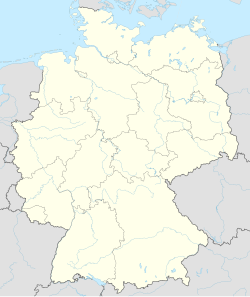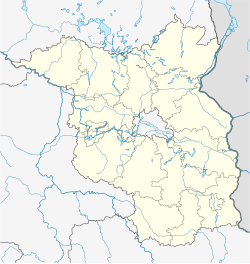Lübben (Spreewald) (Lower Sorbian: Lubin (Błota), pronounced [ˈlubʲin ˈbwɔta]) is a town of 14,000 people, capital of the Dahme-Spreewald district in the Lower Lusatia region in Brandenburg, in eastern Germany.
Lübben
Lubin | |
|---|---|
Lübben Castle | |
Location of Lübben within Dahme-Spreewald district  | |
| Coordinates: 51°57′N 13°54′E / 51.950°N 13.900°E | |
| Country | Germany |
| State | Brandenburg |
| District | Dahme-Spreewald |
| Subdivisions | 6 Ortsteile bzw. Stadtbezirke |
| Government | |
| • Mayor (2022–30) | Jens Richter[1] (CDU) |
| Area | |
• Total | 119.91 km2 (46.30 sq mi) |
| Elevation | 50 m (160 ft) |
| Population (2022-12-31)[2] | |
• Total | 13,966 |
| • Density | 120/km2 (300/sq mi) |
| Time zone | UTC+01:00 (CET) |
| • Summer (DST) | UTC+02:00 (CEST) |
| Postal codes | 15907 |
| Dialling codes | 03546 |
| Vehicle registration | LDS |
| Website | www.luebben.de |
Administrative structure
editDistricts of the town are:
- Lübben Stadt (Lower Sorbian: Lubin město)
- Hartmannsdorf (Hartmanojce)
- Lubolz (Lubolc)
- Groß Lubolz (Wjelike Lubolce)
- Klein Lubolz (Małe Lubolce)
- Neuendorf (Nowa Wjas)
- Radensdorf (Radom; Radowašojce)
- Steinkirchen (Kamjena)
- Treppendorf (Ranchow)
History
editThe castle of Lubin in the March of Lusatia was first mentioned in an 1150 register of Nienburg Abbey and had received town privileges according to Magdeburg law by 1220. It was located on a trade route from Luckau to Gubin and Poznań.[3] From 1301 the town in the centre of the Spreewald floodplain was in the possession of the monks of Dobrilugk Abbey, who sold it to Duke Rudolph I of Saxe-Wittenberg in 1329. After several conflicts with the Wittelsbach margraves of Brandenburg the March of Lusatia was finally acquired by Emperor Charles IV of Luxembourg in 1367 who incorporated Lübben into the Kingdom of Bohemia. In the 15th century Lübben became the seat of the Bohemian Vogt administrator and the provincial diet (Landtag) of Lower Lusatia.
In 1526 the House of Habsburg inherited the Bohemian kingdom including Lusatia, which in 1623 Ferdinand II of Habsburg had to give in pawn to Elector John George I of Saxony. The Saxon Electorate finally acquired Lübben by signing the 1635 Peace of Prague. After the Napoleonic Wars it fell to the Prussian province of Brandenburg by the final act of the 1815 Congress of Vienna. One of the main escape routes for insurgents of the unsuccessful Polish November Uprising from partitioned Poland to the Great Emigration led through the town.[4]
During World War II, the Oflag III-C and Oflag 8 prisoner-of-war camps for Polish, French, British, Australian, New Zealander, Belgian and Dutch officers, a forced labour subcamp of the Nazi prison in Luckau and a subcamp of the Sachsenhausen concentration camp were located in the town.[5][6][7] Lübben was taken by Soviet troops of the 3rd Guards Army on 27 April 1945.
Demography
edit-
Development of Population since 1875 within the Current Boundaries (Blue Line: Population; Dotted Line: Comparison to Population Development of Brandenburg state; Grey Background: Time of Nazi rule; Red Background: Time of Communist rule)
-
Recent Population Development and Projections (Population Development before Census 2011 (blue line); Recent Population Development according to the Census in Germany in 2011 (blue bordered line); Official projections for 2005-2030 (yellow line); for 2020-2030 (green line); for 2017-2030 (scarlet line)
|
|
|
Politics
editThis section needs to be updated. (June 2021) |
Seats in the municipal assembly (Stadtverordnetenversammlung) as of 2008 elections:
- Christian Democratic Union: 7
- Social Democratic Party of Germany: 5
- The Left: 5
- PRO Lübben (Independent): 4
- Free Democratic Party: 1
Lübben is twinned with Wolsztyn in Poland and Neunkirchen, Saarland in Germany.
Places of interest
edit- Spreewald biosphere reserve
- Lübben Castle, on medieval foundations, rebuilt in the 17th century under the rule of Duke Christian I of Saxe-Merseburg
- Neuhaus Manor in Steinkirchen, built in 1801, former residence of author Christoph Ernst von Houwald from 1822 on
- Romanesque St Pancras fieldstone church in Steinkirchen built in the early 13th century, one of the oldest preserved churches in Lower Lusatia
- Paul Gerhardt Church from the 16th century, where Paul Gerhardt preached from 1669 on
- Roman Catholic Trinity Church, built in 1862
Notable people
editBorn in Lübben
edit- Hans Peter Bull (born 1936), German constitutional lawyer and jurist
- Karin Büttner-Janz (born 1952 in Hartmannsdorf), German Olympic medal winner in artistic gymnastics and habilitated doctor
- Henry Eugene Fritz (1875–1956), American painter
- Hans Walter Gruhle (1880–1958), German psychiatrist
- Benno Hann von Weyhern (1808–1890), Prussian General of the Cavalry
- Louis Klopsch (1852–1910), American author and editor of the Christian Herald
- Sylvio Kroll (born 1965), German Olympic medal winner in artistic gymnastics
- Kornelia Kunisch (born 1959), German handball player, 1980 Olympic bronze medal with the East German team
- Christian Lillinger (born 1984), German musician and composer
- Karl Otto von Manteuffel (1806-1879), German politician, Prussian agriculture minister
- Otto Theodor von Manteuffel (1805–1882), German politician, Minister-President of Prussia
- Rudolf Marloth (1855–1931), South African botanist, pharmacist and analytical chemist
- Ella Mensch (1859–1935), German writer, journalist, teacher, feminist and editor
- Richard Constantin Noschke (1867–1945), diary of his World War I Alexandra Palace internment sufferings in Imperial War Museum, London.
- Benjamin Raschke (born 1982), German politician, member of the Landtag of Brandenburg
- Thorsten Rund (born 1976), German cyclist
- Carl Siegemund Schönebeck (1758–1806), German composer and cellist
- Lavinia Schulz (1896–1924), German dancer and actress
- Ingo Spelly (born 1966), East German-German sprint canoer, Olympic champion
Related to Lübben
edit- Wolfgang Figulus (c. 1525 – c. 1591), German composer and teacher, 1545 or 1546 cantor in Lübben
- Paul Gerhardt (1607–1676), German hymn writer, 1668 till his death archdeacon of Lübben
- Renate Holm (1931–2022), German-Austrian film actress and operatic soprano, school in Lübben
- Christoph Ernst von Houwald (1778–1845), German dramatist and author, died at Neuhaus
- Götz von Houwald (1913–2001), German diplomat, historian and ethnographer, completed his secondary education in Lübben
- Albert Naumann (1875–1952), German fencer, died in Lübben
- Jens Riewa (born 1963), German television presenter and broadcast news analyst for the Tagesschau, grew up in Lübben
- Immanuel Johann Gerhard Scheller (1735–1803), German classical philologist and lexicographer, teacher in Lübben
- Daniel Ziebig (born 1983), German footballer, used to live in Lübben
- We Butter the Bread with Butter, German deathcore band formed in 2007
References
edit- ^ Landkreis Dahme-Spreewald Wahl der Bürgermeisterin / des Bürgermeisters, accessed 13 November 2022.
- ^ "Bevölkerungsentwicklung und Bevölkerungsstandim Land Brandenburg Dezember 2022" (PDF). Amt für Statistik Berlin-Brandenburg (in German). June 2023.
- ^ Pieradzka, Krystyna (1949). "Związki handlowe Łużyc ze Śląskiem w dawnych wiekach". Sobótka (in Polish). IV (4). Wrocław: 90.
- ^ Umiński, Janusz (1998). "Losy internowanych na Pomorzu żołnierzy powstania listopadowego". Jantarowe Szlaki (in Polish). No. 4 (250). p. 16.
- ^ Megargee, Geoffrey P.; Overmans, Rüdiger; Vogt, Wolfgang (2022). The United States Holocaust Memorial Museum Encyclopedia of Camps and Ghettos 1933–1945. Volume IV. Indiana University Press, United States Holocaust Memorial Museum. pp. 211–212, 235. ISBN 978-0-253-06089-1.
- ^ "Außenkommando des Zuchthauseses Luckau in Neuendorf". Bundesarchiv.de (in German). Retrieved 8 November 2023.
- ^ "Anlage zu § 1. Verzeichnis der Konzentrationslager und ihrer Außenkommandos gemäß § 42 Abs. 2 BEG" (in German). Archived from the original on 23 April 2009. Retrieved 8 November 2023.
- ^ Detailed data sources are to be found in the Wikimedia Commons.Population Projection Brandenburg at Wikimedia Commons
External links
edit- Lübben (Spreewald) – official website
- Old postcards of Lübben
- . Encyclopædia Britannica (11th ed.). 1911.


